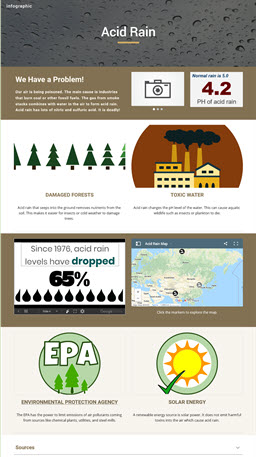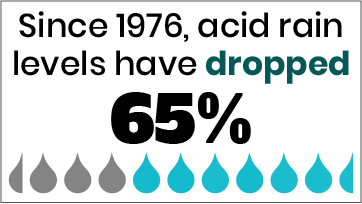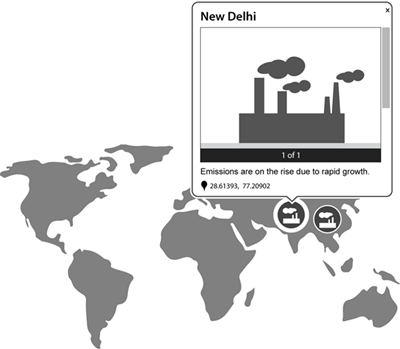April 22, 2020 marks the 50th anniversary of Earth Day.

On the first Earth Day in 1970, 20 million people in the United States demonstrated for a healthy, sustainable environment. They brought awareness to the extinction of wildlife, destruction caused by pollution, and loss of wilderness. In 1990, Earth Day became a global event with 141 countries and 200 million people organizing to campaign for environmental issues. As its 50 year milestone approaches this year, the movement continues to challenge everyone to make a difference. The energy and enthusiasm of young people is a powerful force to drive change and impact our planet.
Teacher Resources for Earth Day
Earth Day Online
Earth Day is just one of the many online sites available to teachers and students. It includes ideas and resources to inspire and drive climate action:
Register an Earth Day Event
View events in your area by zooming in on the Earth Day site map. See the range of events in the world. Or place a dot on the Earth Day site map by registering your own event. It can be a clean-up, rally, teach-in, art fair, or your own idea!
Get Informed on Environmental Issues
Read about the range of areas in which Earth Day initiatives are working. Sign up as an Earth Day School to get on the map to commemorate the 50th anniversary of Earth Day. Commit to what your school will do in 2020.
Download Educational Resources
Browse through activities and lessons provided specifically for educators, for example:
- Lesson plans on air quality and plastic pollution
- Ways of engagement such as schools, clubs, parks, media, businesses, and more
- Latest News and Stories
- Social Media Sharing and Posters
And there’s lots more!
TechnoKids Earth Day Event
Only from April 2 until April 15, 2020 get TechnoEarth technology project at special promotional pricing.
Teach the whole curriculum unit to create an interactive infographic using Google Sites based on a specific environmental issue. Step-by-step instructions support middle school learners as they explain the cause, harmful effects, stakeholder interests, location data, and solutions to a local or international problem.
Combine Google Docs, Slides, Sites, Sheets, My Maps, and Drawings to produce a web-based publication. Integrate the unit into a digital literacy, science, or geography unit to mark Earth Day 2020. Download the project into your TechnoKids digital library here.
Fun Activities to Take Earth Day Action
Have less class time? Pick a single, quick lesson to inspire and raise awareness as Earth Day approaches on April 22. Here are some ideas.
TechnoKids’ technology project TechnoEarth teaches students to become environmental stewards. But you can pick and choose some lessons to teach in a single day or just a few computer classes.
Explore a Sample Infographic
To encourage Earth Day action, students can examine the sample Acid Rain infographic provided in the TechnoEarth resources. In Assignment 2, they learn about the features of an infographic and the reasons to use this format to inspire awareness. They answer questions about the contents and design of the sample. In just one brief lesson, spark an interest in environmental concerns.

Discover TechnoEarth Fact Sheets
Included in the TechnoEarth resources are 13 fact sheets on a range of environmental issues. These are provided to support learning. Environmental topics are complicated issues with scientific detail and complex vocabulary. The fact sheets are simpler, one-page outlines that may replace online research to save class time or to meet individual student needs. As an Earth Day lesson or to spark further interest, students analyze the fact sheets:

- Acid rain
- Clear cutting
- Endangered species
- Garbage
- Invasive species
- Mountaintop mining
- Nuclear energy
- Oil sands
- Overfishing
- Plastic pollution
- Poaching
- Water consumption
Create an Image Carousel of Harmful Effects
TechnoEarth includes optional lessons to challenge students. Session 2 Extension Activity lists instructions to make an image carousel in Google Sites. A series of photographs is selected to portray the harmful effects of an environmental problem. The pictures create a photo gallery through which the viewer can scroll. Research the images individually or have students collaborate in pairs or groups on a specific topic. The collection creates a compelling view of the problem in one stand-alone activity.
Inform with a Pictograph
Another quick, Earth Day lesson is Session 3 Extension Activity. Use the Big number slide layout in Google Slides to make an eye-catching pictograph. With iconic, universally recognized symbols, students create a visual that graphically depicts the numerical data of an environmental issue.

Pinpoint a Problem Location
Produce a thematic map about a particular environmental issue using Google My Maps. In Session 4, a map is created to highlight worst offenders, best stewards, disaster sites, at-risk regions, successful conservation projects, or legally protected areas. A marker locates the place, the icon style of the marker is customized, and interesting facts and photos are selected and included. Publishing just the map can be an engaging way to communicate the scope of an issue.

Boost Search Strategies Using Environmental Issues
TechnoEarth Session 1 Skill Review gives students tips about how to find information fast. They learn explicit, effective search strategies. Then they apply their skills to search online and find results for specific environmental topics.
Students Are Spreading the Word
TechnoKids was recently contacted by a master’s student at San Diego State University. He has written a thorough and highly engaging article as a guide to vehicle recycling and is looking to share his work. Thank you, Carmen, and congratulations on your contribution to the environment.
TechnoEarth Technology Project and Activities
Whether you can allocate just one class or a complete unit of study to promote environmental awareness, TechnoEarth is an ideal resource for Earth Day celebrations. The half price promotion is only available April 2 – April 15, so act now and order here. Spark an interest in students to become environmental stewards!
